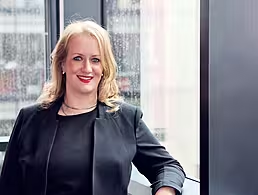We talked to TCS’ Gerard Grant about the trends dictating the competitive smart systems industry and how professionals can forge a career.
The smart systems career path is an exciting one, as it puts the professional at the forefront of modern innovation. From smart cities, healthcare and finance, to R&D, consultancy and telecommunications, the options within this field and the opportunities to create a solid career are almost limitless.
As with all industries driven by skill and advanced technologies, smart systems careers benefit greatly from the cross-functionality of the various disciplines that are required to keep it all moving forward. For Gerard Grant, the director of strategic initiatives at TCS Ireland, it is this convergence of sectors that is the trend most affecting employees in the short to medium term at the moment.
“When we think about the smart technology industry, it’s currently made up of several foundational and disparate technologies, artificial intelligence, machine learning, internet of things and automation. The ecosystem is underpinned by a mix of physical devices, sensors, data analytics, cloud computing and next-generation wireless networks, 5G and 6G,” he told SiliconRepublic.com.
This continuing trend of convergence will likely lead to a future in which core technologies, supported by significantly larger and more reliable datasets, will have the power to disrupt many of the current technology jobs, while also generating entirely new career categories for professionals to explore, Grant said.
Smart system trends
He foresees smart systems greatly affecting the employee experience as the further integration of AI, data and automation-based technologies will streamline monotonous tasks, free up time for higher value activities and allow for real-time decision making. It does, however, come at a cost, as according to Grant, “this technology will eventually replace or eliminate certain tasks and roles”.
Employee surveillance is also moving front and centre in the smart technology industry as companies have the ability to closely monitor corporate buildings and security systems at scale, identify trends and further their insights in employee behaviour and productivity.
“A hybrid working environment protects the balance of productivity and privacy. However, individual machine and mobile device monitoring including location pattern matching are all considerations for both employees and employers as smart technologies are embraced.”
Grant is of the opinion that cybersecurity is going to become increasingly concerning as more and more devices are linked to corporate networks. Previously, traditional offices had a limited number of connected devices, but nowadays, almost everything can be digitalised, putting more pressure on cybersecurity systems to withstand malicious behaviours.
“The proliferation of non-PC based IoT devices from door locks, vending machines, turnstiles, CCTV cameras, HVAC and motion sensors, has opened up a whole new front in cybersecurity. These devices are typically installed and commissioned by non-IT service providers with default security settings, creating a weak link in certain network segments.”
Forging your own path
While no job will ever be 100pc secure and technology will render many roles obsolete, there is a sense of security in operating within a field that demands a constant stream of innovation, talent and advancement.
For anyone looking to enter the smart systems industry, Grant would encourage the development of a broad range of technical skills with a focus on data and systems integration and to avoid building up a homogeneous technology stack that is no longer representative of the wider smart tech sector.
“There are some fundamentals that need to be understood to begin charting a career in this area including a strong understanding of control-based programming languages like Python and C# along with a solid understanding of various IoT networking conventions like z-wave, BLE and Zigbee”.
Soft skills such as decision-making are also crucial and requires the use of historical data, decision logic and backup routines in the event of failure. Other basic abilities include cloud skills, cybersecurity and observability knowledge to monitor and manage the platforms once they are built and operational.
“Outside of the core tech skills, there will be a natural governance requirement to ensure the data that underpins the models, specifically as they pertain to AI, are governed correctly and making decisions in line with the business objectives, the law and common social good.
“This will create a significant new category of careers ensuring the quality and efficacy of smart tech. It has the ability to scale and sprawl quite quickly and without good controls can impact budgets, cybersecurity and company reputations.”
Smart systems is a dynamic, adventurous sector undergoing a transformation brought about by mass technological advancement. For Grant, anyone looking to enter into the industry could benefit greatly from better understanding the converging trends and patterns.
He believes that, ultimately, the most “significant trend will be in the way we work, the skills we need to govern smart technology to ensure objective decision-making and ethical behaviour alongside managing the digital waste created over the long term”.
Don’t miss out on the knowledge you need to succeed. Sign up for the Daily Brief, Silicon Republic’s digest of need-to-know sci-tech news.




